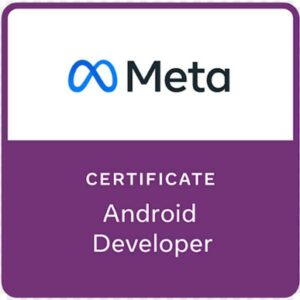Even after close to 20 years of smartphones, their usage keeps increasing year by year, with an estimated 5.25 billion globally in 2023. If you want to reach those consumers, developing for mobile devices is clearly a good idea.
With Google’s Android operating system making up about 70% of the market (although by spending, Apple’s iOS revenue is in fact higher), there is a huge demand for developers for the platform. To help with meeting that demand and getting more people qualified to develop for Android, Meta has recently launched a new program via Coursera.
The Meta Android Developer Professional Certificate offered through Coursera is a comprehensive online program designed to empower learners with the skills to develop Android applications using industry-leading programming languages and frameworks, such as Kotlin and React Native. By the end of this course, you should have the knowledge and skills to create your own Android application.
I was naturally interested in what this program had to offer – having gone through it, you will find my review and recommendations below.
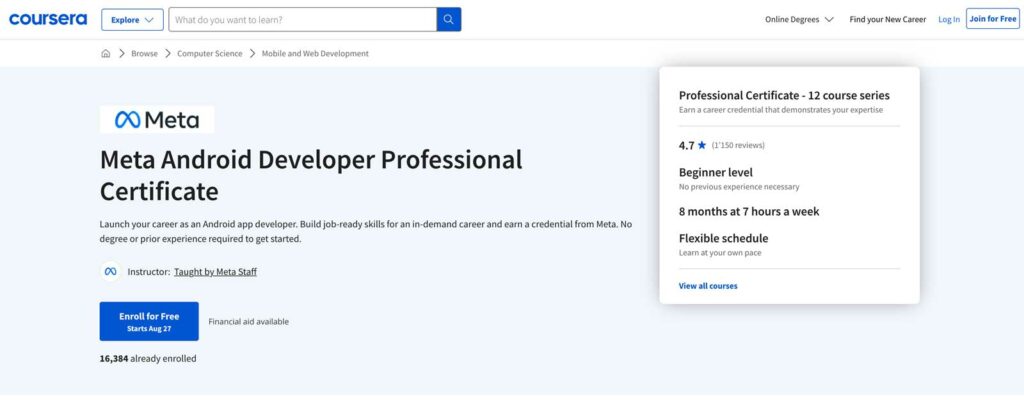
Table of Contents
Overview of the Meta Android Developer Professional Certificate
Offered on Coursera, the Meta Android Developer Professional Certificate program encapsulates practical knowledge and industry best practices in Android development. The program does not just equip you with essential Android programming concepts and tools, but it also emphasizes designing user interfaces (UIs) that are both visually appealing and functionally robust.
Additionally, the course provides a deep dive into React Native, enabling you to build, style, and interact with single-page applications effectively. Key software and tools like React, JSX, Expo, and Visual Studio Code are also covered, providing a well-rounded experience.
With the increasing demand for mobile developers in the job market, having the knowledge and experience in Android development could significantly boost your employability. Upon completion, you will gain access to the Meta Career Programs Job Board, connecting you with over two hundred employers who are actively looking for talent in the field. Additionally, the course also provides career support resources to assist you in your job search.

Please note that I had access to the entire paid program, which provides complete access to all exercises and assignments. The pacing felt manageable and appropriate to me. However, keep in mind that you can audit any course that is a part of the Professional Certificate if you’re on a tight budget or would like to try out the Program before purchasing (albeit you won’t get access to all assignments or a certificate of accomplishment).
Alternatives and complements to this Certificate
The online learning landscape for Android development is vibrant and varied, offering learners an array of courses that cater to different learning styles and goals. While I recommend the Meta Android Developer Professional Certificate program for many learners, it is not the sole provider of comprehensive Android development learning, and you might want to look into a few options.
A multitude of alternatives exist on platforms like Udemy, Alison, and edX, including courses such as the Udacity Android Developer Nanodegree and the Pluralsight Android Developer Learning Path. Moreover, Meta also offers an iOS Developer Professional Certificate program that my colleague has reviewed for those interested in cross-platform development.
Each of these courses has its own strengths in building Android development skills, but there are distinct aspects that set the Meta Android Developer Professional Certificate apart. Firstly, the course is conducted by industry experts from Meta, providing learners with the unique opportunity to acquire knowledge and skills from those who are responsible for creating some of the most popular Android apps globally.
Secondly, enrolling in the Meta Android Developer Professional Certificate grants learners access to the Meta Career Programs Job Board. This portal connects learners with potential employers actively seeking Android developers, thus facilitating a smoother transition from learning to professional application.
While there are numerous resources available for Android development, the Meta Android Developer course distinguishes itself through its blend of expert-led instruction, practical exercises, and direct job board access, offering a holistic and industry-relevant learning experience.
Level and prerequisites
This course is suitable for anyone interested in Android development, regardless of their previous experience. It does, however, require a basic understanding of programming concepts.
How much does the Professional Certificate cost?
The Meta Android Developer Professional Certificate program on Coursera requires the completion of 12 courses and a capstone project, taking an estimated eight months at a study pace of 7 hours per week. For those who are planning to enroll, it operates on a subscription plan costing $49 per month, totaling $392 for the entire duration.
Keep in mind that this Professional Certificate is separate from Coursera Plus subscriptions and requires payment. If someone is looking to save money, the program can be finished in less than the recommended time of eight months since it’s self-paced. As for most Coursera courses, it is also possible to audit the individual courses of the Professional Certificate for free. Coursera also provides a 7-day free trial as well, which allows a review of the course material before committing to a paid plan.
Who are the instructors?
The “Meta Android Developer” course is led by experienced instructors from the Meta staff. They bring a wealth of knowledge to the table, drawing from a rich blend of academic and practical experience to ensure that learners fully grasp the essentials of Android development.
This course is an excellent springboard for those aspiring to become mobile developers, offering not just theoretical knowledge but also practical, hands-on experience in developing an application from scratch. The course provides an in-depth exploration of Android Studio and crucial concepts of Android app development, making it a perfect stepping stone into the world of mobile application development. The experience of the instructors shines through in many of the courses, making becoming a developer seem like an achievable goal.
Detailed review
Program features
The course syllabus is supplemented with quizzes and assessments, offering a holistic and enriched learning experience. These additions are crucial in assessing the learner’s understanding and ensuring the practical applicability of the learned concepts. They provide an optimal balance of theoretical and practical aspects, making the learning journey even more fulfilling. Moreover, learners are equipped with a variety of tools like React.js, JSX, HTML, CSS (Cascading Style Sheets), JavaScript, VSCode, and Android Studio, further enhancing their learning experience.
In addition to the modules, the course syllabus is significantly enriched with quizzes, assessments, and practical exercises. These elements not only evaluate the learner’s understanding but also ensure the practical applicability of the concepts learnt.
Quizzes and Mini-Projects
The Meta Android Developer Course provides a comprehensive set of exercises that make learning more engaging and interactive. These exercises, a blend of quizzes and mini-projects, facilitate a practical approach to the theoretical knowledge imparted in the lectures.
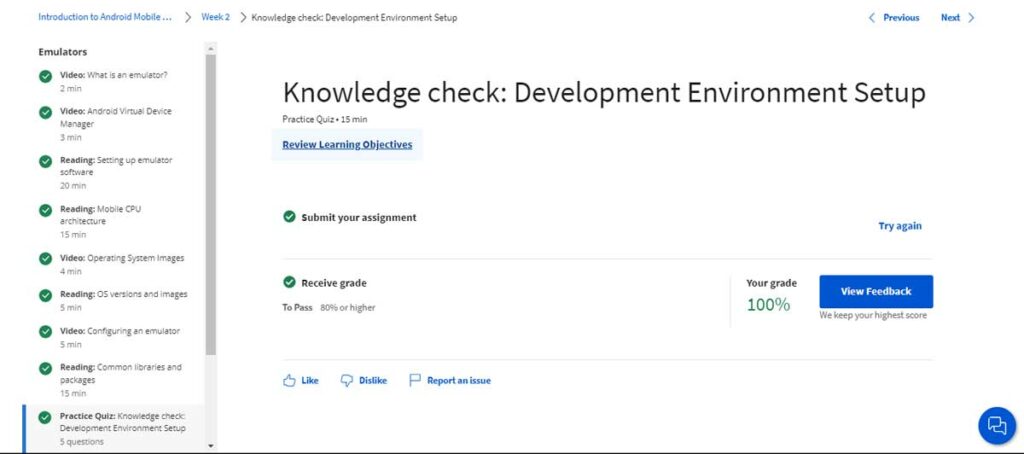
The quizzes challenge learners to recall and apply the knowledge they have gained, reinforcing key concepts and principles. They serve as a means for learners to evaluate their understanding of the content, helping them pinpoint areas where they may need additional review or study.
In addition to quizzes, learners also engage in mini-projects, like creating a video player, which provides a practical, hands-on experience of Android development. These projects allow learners to experiment with the application of concepts in a real-world context, integrating theory with practice. They provide an opportunity for learners to explore different facets of Android development while honing their programming skills.
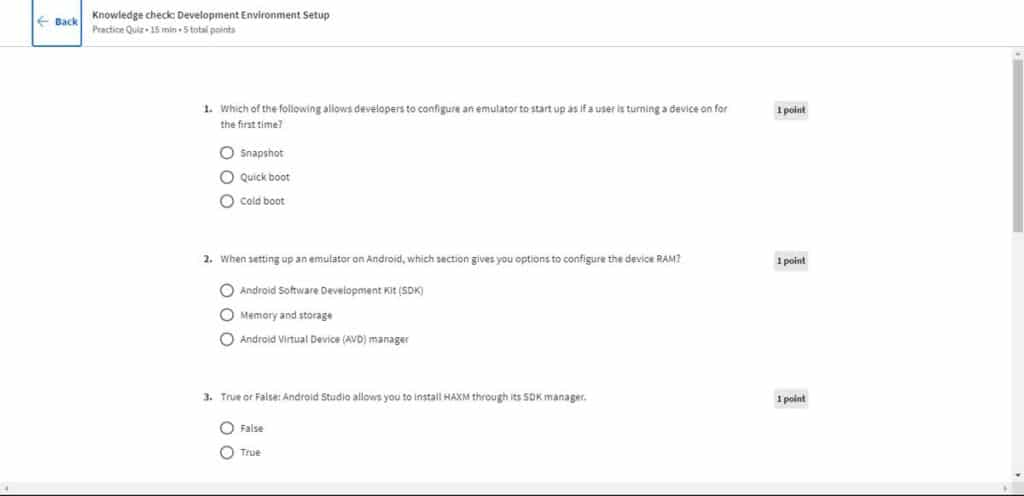
Interactive Discussion Forums: Engaging learner communities
A useful feature of the Meta Android Developer Course is its interactive discussion forums, which allow learners to share and exchange ideas, raising questions such as “What interests you most about this course?” and “What do you hope to gain from this experience?” The forums also facilitate introspective thinking by encouraging questions like “How does this course align with your career goals?”
These discussions foster a sense of community and active engagement, enabling learners to learn from each other’s experiences and perspectives. This collaborative platform enhances the overall learning process, fostering deeper comprehension and knowledge retention.
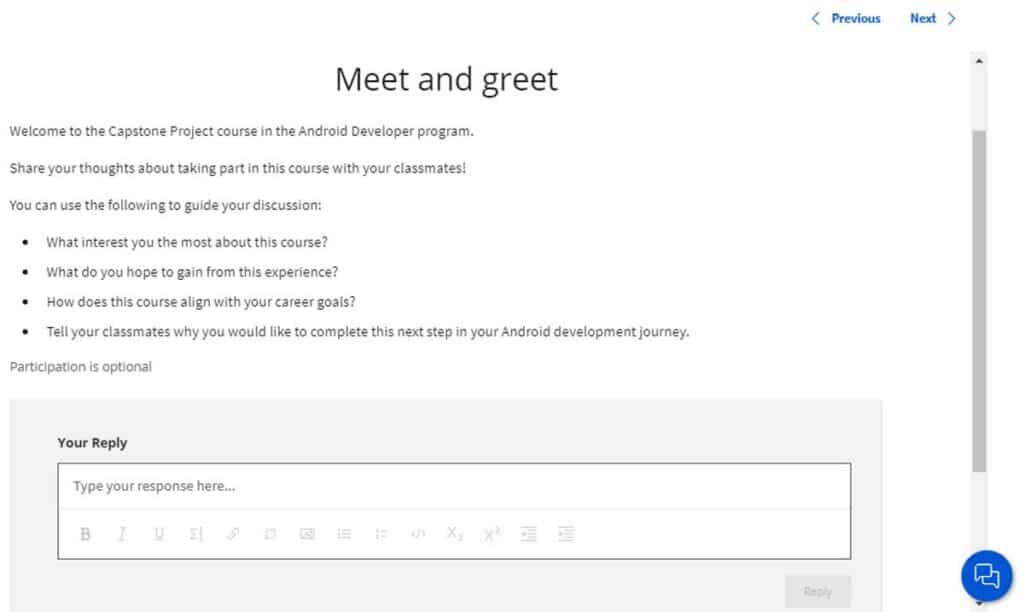
Capstone Project
The Meta Android Developer Course culminates in a challenging capstone project that calls for the application of all the skills acquired throughout the program. Learners are tasked with developing a functional Android application for the Little Lemon restaurant, thus providing a real-world solution to a practical problem.
Despite having acquired all the necessary skills at this point in the program, learners might need to revisit some concepts from previous courses. The course acknowledges this need, providing brief recaps of relevant content from prior modules. This ensures learners are thoroughly guided and supported in their journey to build the Little Lemon food ordering app.
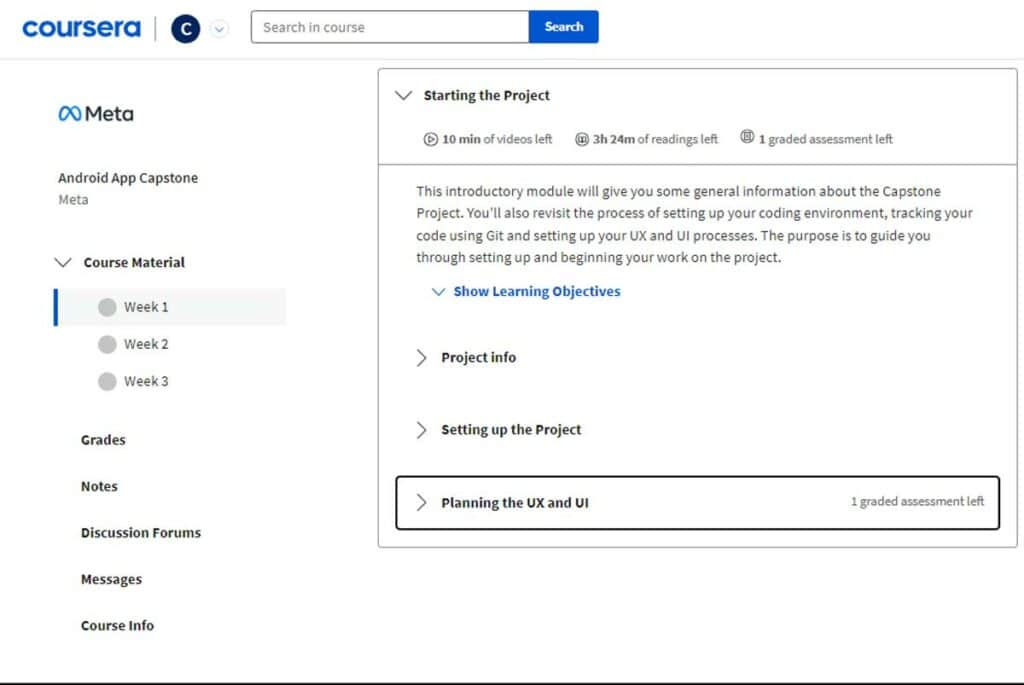
In the project, learners are expected to accomplish several tasks that demonstrate their grasp of Android development. These tasks include the configuration of a Jetpack Compose application, contributing to a Git repository through project commits, crafting an intuitive user interface (UI) and user experience (UX) for the application, establishing an effective navigation structure among the application’s screens, and designing a user-friendly onboarding process. As a result, learners demonstrate their ability to develop a food menu user interface and create a user-friendly, interactive mobile application.
Upon successful completion of the Capstone Project, learners have a dynamic, fully functional mobile application to showcase to potential recruiters, effectively displaying their capabilities and preparedness for a career in Android development. This advanced course is designed for those with a background in Android development, though the key to success lies in a resilient, can-do attitude.
Supplementary Resources
To support the learning journey, the Meta Android Developer Course offers a multitude of additional resources at the end of each module. These include curated articles, research papers, blog posts, tutorials, and videos, all focused on enhancing the learners’ understanding of the covered topics.
These resources are particularly beneficial for those learners who wish to delve deeper into the subject matter. They provide a broader perspective, assisting learners in staying updated with the latest trends and developments in Android development. They also serve as a springboard for learners interested in undertaking independent research or projects.
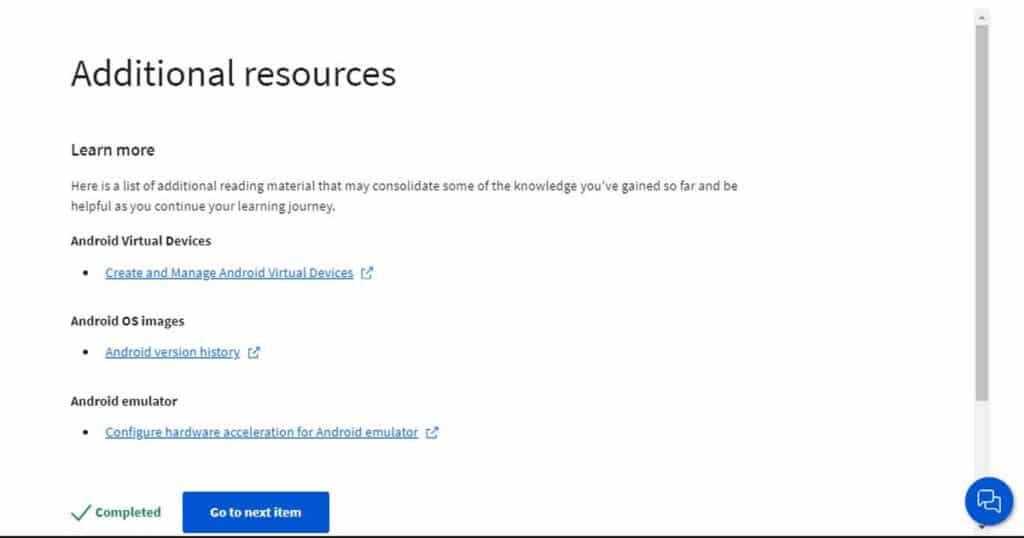
Each module concludes with an interactive question, acting as a summary and self-assessment tool. This engagement not only helps learners consolidate their learning but also fosters a sense of community, promoting collaborative learning and peer interaction.
The Meta Android Developer Course goes beyond conventional teaching methods, providing an enriching and transformative learning experience. Its emphasis on practical understanding through exercises, projects, and supplementary resources prepares learners for a thriving career in the dynamic field of Android development.
Detailed review
Syllabus overview
The course spans across key areas of Android app development including, but not limited to:
- Essential Android programming concepts
- User experience design and research skills
- Basic and advanced concepts of React Native
- Tools and software such as React, JSX, Expo, and Visual Studio Code
The course is broken down into twelve separate courses, each focusing on a different aspect of Android development:
- Introduction to Android Mobile Application Development.
- Version Control
- Programming Fundamentals in Kotlin Course
- Principles of UX/UI Design
- Create the User Interface in Android Studio
- Advanced Programming in Kotlin
- Working with Data in Android
- Mobile Development and JavaScript
- React
- React Native
- Android App Capstone This segment is a culmination of everything learned throughout the course.
- Coding Interview Preparation
Each segment comes with an estimated completion time and provides a rating based on feedback from previous learners. You will learn various skills, such as creating arrays, using Kotlin Playground, implementing version control systems, and more. It is a thorough, comprehensive guide for those eager to venture into the field of Android app development.
As a self-paced course, it offers the flexibility to tailor your study schedule according to your personal needs. This adaptability allowed me to spend additional time on concepts I found challenging, ensuring that I gained a thorough understanding of each topic before moving on to the next. The course is designed to be completed in approximately eight months; however, I found that this timeline can vary depending on the amount of time you can commit each week.
One of the standout aspects of this course is the hands-on activities and projects that accompany the learning material. These projects enabled me to put the theoretical knowledge I had gathered into practice, reinforcing the concepts and solidifying my comprehension. The result of these efforts was a project-based portfolio that highlighted my newly acquired skills—an impressive asset when demonstrating your expertise to potential employers and recruiters.
This course offers a blend of theoretical knowledge and practical application, equipping you with the skills needed to create your own Android applications and potentially kick-start a successful career in mobile development.
Let’s have a look at each of the component courses in a bit more detail.
Course 1: Introduction to Android Mobile Application Development
The course commences with an introduction to Android Mobile Application Development. This module, which serves as a springboard for aspiring mobile developers, provides a high-level overview of programming and the tools required for Android application development. It offers an extensive understanding of Android Studio and the foundational principles of Android app development. The practicality of the Android Studio interface and its configurations is one of the standout features of this module.
However, the pace of the course might be intense for beginners, and the Android Studio setup guidelines could benefit from being more comprehensive.
Course 2: Understanding the Process of Version Control
Transitioning from the basics, the next module delves into the understanding of Version Control. It discusses how modern software developers collaborate worldwide without disrupting each other’s code, presenting a study of different version control systems and how to establish an effective software development workflow.
Although the command-line instructions might be intimidating, the course offers comprehensive knowledge about using GitHub repositories efficiently and managing code changes effectively.
Course 3: Programming Fundamentals in Kotlin
Further, the course moves towards Kotlin Programming Fundamentals. Since Kotlin is the preferred language for Android app development, it provides an exhaustive introduction to it. The course emphasizes operators and functions in Kotlin through practical exercises. It does assume a prior understanding of programming, which might be a bit overwhelming for those without any previous experience in the field. Nonetheless, the practical orientation of the course is quite beneficial for grasping Kotlin’s essential concepts.
Course 4: Exploring the Core of UX/UI Design Principles
Following Kotlin, the course introduces the fundamentals of User Experience (UX) design and research. It delves deep into UX’s methodologies, right from identifying problems to iterating and testing designs for appropriate solutions. It provides a comprehensive understanding of UX design principles and the practical use of Figma for creating wireframes and prototypes.
While the course could delve deeper into design principles, the practical aspects of the course prepare learners for real-world design scenarios. To excel in this course, previous web development experience is not a prerequisite. All you need is fundamental internet navigation skills and a keen desire to delve into the world of coding.
Course 5: IT Security - Creating the User Interface in Android Studio
The next module is devoted to creating a User Interface in Android Studio. It provides real-world experience in building user interfaces, using:
- Layout editor
- TextView
- ImageView
- Button
- ViewGroups
- RecyclerView
- Jetpack
Although working with UI component libraries might be overwhelming initially, the practical exercises provide critical hands-on experience, offering significant value eventually. This course does not require you to come armed with web development experience. All you need are rudimentary skills in internet navigation coupled with an enthusiastic readiness to embark on your coding journey.
Course 6: Advanced Programming in Kotlin
Next, the course delves deeper into the advanced aspects of Kotlin, covering its object-oriented features, unit testing, and lambda expressions. The complexity of these topics can be overwhelming for beginners. Still, this module equips learners with the necessary skills to tackle future programming challenges, thereby serving as an essential milestone in their learning journey. In this course, you require a foundational understanding of Kotlin programming fundamentals and of creating a UI in Android Studio.
Course 7: Working with Data in Android
This module allows learners to explore various tools and packages in Kotlin. It covers how Kotlin applications communicate over the web, data formats, web protocols, asynchronous programming techniques, and core functionality and uses of the SQLite database management system (DBMS).
Although integrating code from other languages into Kotlin could be complex for some, the real-world application of Kotlin coroutines is particularly useful. An advanced understanding of Kotlin programming, along with a functional knowledge of operating Android Studio, is needed to complete this course.
Course 8: Mobile Development and JavaScript
Following Kotlin, the course introduces learners to JavaScript, an essential language in web development. Despite JavaScript’s challenges, the ability to write unit tests using Jest is a critical skill for any developer, thereby offering an enriching learning experience.
Course 9: React Basics
The next segment provides a robust understanding of React, a powerful JavaScript library used to build user interfaces for web and mobile applications. However, learners without a good grasp of JavaScript may find some parts of the course challenging but you do not need prior development experience, only basic internet navigation skills and an eagerness to get started with coding.
Course 10: React Native
The course introduces learners to React Native, a powerful framework for building cross-platform apps. While it assumes familiarity with JavaScript, it offers extensive experience with various React components. To succeed in this course, you will need a foundational knowledge of React basics and internet navigation skills.
Course 11: Android App Capstone - Applying the Knowledge
The capstone project is the culmination of the Meta Android Developer Course, offering learners the opportunity to apply their accumulated knowledge and skills to create an engaging and efficient Android application. The task at hand is the development of the “Little Lemon” food ordering app, a project specifically designed to highlight learners’ Android development prowess.
At this point in the program, learners have gained all the necessary skills to successfully complete this project. However, given the comprehensive nature of the course, there might be a need to refresh certain concepts from previous modules. To facilitate this, each module within the capstone course includes a brief recap of relevant content from preceding courses. Links to detailed content are provided, allowing learners to review and reinforce their understanding as needed.
Guided through each step of building the “Little Lemon” app, learners will find themselves revisiting and applying various facets of Android development, from UI design and database integration to utilizing third-party libraries and ensuring the smooth performance of the app.
The hands-on experience gained through this capstone project is invaluable. While the project’s scope might appear daunting to some, the structured guidance and resources provided ensure that learners are well-equipped to navigate through the challenges. It is a rewarding endeavor that solidifies the learning journey, enabling learners to confidently demonstrate their capabilities in Android development.
Course 12: Coding Interview Preparation - Making the Mark
The last segment of the course helps learners prepare for coding interviews, with a focus on the process at Meta. It offers strategic insights and tips for successful interviewing, enabling learners to handle unique aspects of a coding job interview effectively.
What do others say?
The self-paced format of the course affords a certain flexibility that is particularly appreciated by many learners. As one testimonial reveals, the course design allows learners to “learn whenever it fits the schedule and mood.” The course structure empowers learners to take control of their learning journey and pace their progress based on their personal schedules and preferences.
Moreover, the course stands out for its applicability to real-world scenarios. As echoed in several testimonials, learners have found that the concepts and skills taught in the course are directly transferable to professional projects.
However, a clear consensus among learners, as captured in a lively Reddit thread discussion, indicates that while the Meta Android Developer Professional Certificate is an asset, it should not be seen as a substitute for a formal Computer Science degree. The participants underlined the fact that a Computer Science degree offers a more in-depth, comprehensive understanding of the field than any online course could provide.
Contrasting opinions emerged when discussing the difficulty level of the course. Some learners suggested that the course content can be challenging for those without prior experience, while others opined that it simplifies complex concepts, making them easy to understand. It is evident that the course’s complexity may vary based on the learner’s background and prior knowledge.
Overall, the Meta Android Developer Professional Certificate is lauded for its comprehensive content, flexible learning structure, and real-world applicability. It has been recognized for offering high-quality professional training from Meta, and the certificate carries substantial weight in the job market. Although testimonials reveal differing opinions regarding the course’s difficulty level, the consensus supports its value as a substantial addition to a learner’s educational arsenal, particularly for those aspiring to a career in Android development.
Conclusion and recommendations
In conclusion, the Meta Android Developer Professional Certificate is a comprehensive, well-structured, and practical program that provides valuable skills and knowledge in Android development. It is an excellent investment for anyone looking to start a career in Android development.
The course requires a considerable time investment, and some of the concepts can be challenging. However, the return on investment is significant. By the end of the course, you will have a solid foundation in Android development and a portfolio project that you can showcase to potential employers.
In my experience, the course exceeded my expectations in terms of the quality of content, course delivery, and the valuable hands-on experience it provided. I would highly recommend the “Meta Android Developer” course to anyone interested in venturing into the field of Android development.
40% ($140 USD) off your first year of Coursera Plus Annual (expires 2 December 2024)
